The use of digital media in early childhood education: a reflection from skills and abilities
DOI:
https://doi.org/10.20873/uft.rbec.e15677Abstract
ABSTRACT: The use of media in early childhood education has found barriers, especially regarding teaching practice. This article aims to reflect on the challenges of teaching practice regarding the use of media in Early Childhood Education; also reflect on the concepts of competence and skill contextualizing with the documents that guide Early Childhood Education and some authors who discuss this subject. For this, qualitative research of bibliographic nature was carried out. Data analysis occurred through the interpretation of theoretical documents and texts, which pointed to the polyvalence of the concepts of competence and skills, which became popular with the implementation of the BNCC. The results of the research made it possible to show that the child should be protagonist in their interaction with the media world, thus, the school must ensure it’s social, cultural, digital and with its peers, overcoming traditionalism and the role centered on the teacher. They also showed that there is a paradox caused by the different positions of educators regarding the use of media in Early Childhood Education.
Downloads
References
BELLONI, Maria Luiza; GOMES, Nilza Godoy. Infância, Mídias e Aprendizagem: Autodidaxia e Colaboração. Revista Educação & Sociedade, Campinas, vol. 29, n. 104-Especial, p. 717-746, out. 2008. Disponível em: https://www.scielo.br/j/es/a/ TnqxLwrqkSJc6CmgLf8dMgq/abstract/?lang=pt Acessado em: 05 de maio de 2020.
BRASIL. Constituição da República Federativa do Brasil (1988). Brasília, DF: Senado Federal,1988. Disponível em: https://www2.senado.leg.br/bdsf/bitstream/ handle/id/518231/CF88_Livro_EC91_2016.pdf. Acessado em: 23 jul. 2021.
BRASIL. Referencial Curricular Nacional para a Educação Infantil. Ministério da Educação e do Desporto, Secretaria de Educação Fundamental. Vol. 1,2,3. Brasília, MEC/SEF, 1998. Disponível em: http://portal.mec.gov.br/seb/arquivos/pdf/rcnei_vol1.pdf. Acessado em: 10 de ago. de 2021
BRASIL. Ministério da Educação. Secretaria da Educação Básica. Diretrizes Curriculares Nacionais para a Educação Infantil. Brasília: MEC/SEB, 2019.
BRASIL. Ministério da educação. Base Nacional Comum Curricular. Disponível em: http://basenacionalcomum.mec.gov.br/images/BNCC_EI_EF_110518_versaofinal_site.pdfOL Acessado em: 09 de ago. de 2021.
LAKATOS, Eva Maria; DE ANDRADE MARCONI, Marina. Metodologia do trabalho científico: procedimentos básicos, pesquisa bibliográfica, projeto e relatório, publicações e trabalhos científicos. 2001.
LÉVY, P. Cibercultura. Rio de Janeiro: Editora 34, 1999. Disponível em: https://mundonativodigital.files.wordpress.com/2016/03/cibercultura-pierre-levy.pdf. Acessado em: 28 de abril de 2022.
LOPES, Francisca R.; MENEZES, Liliane R. A.; MOURA, Elizângela, S. S. Formação de Educações para a Educação Infantil: Desafios de alfabetizar a Geração Centennial. Revista Humanidades e Inovação v.6, n.15 – 2019. Disponível em: Humanidades & Inovação (unitins.br). Acessada em: 28 de abril de 2022.
MORAN, J. M. Novais. Tecnologias e Mediação pedagógica. 16ª Ed. Papirus, p.11-65. Campinas, 2009.
MORAN, J.M.; MASETTO, M.T.; BEHRENS, M.A. Novas Tecnologias e mediação pedagógica. 21ª edição revisada e atualizada. Págs.12, 31 e 53 – Campinas, SP: Papirus, 2013.
MORAES, S.A., TERUYA, T.K. Paulo Freire e formação do professor na sociedade tecnológica. p. 2, 5, 7. UNIOESTE – Universidade Estadual do Oeste do Paraná. Cascavel, PR. 2010.
PERRENOUD, Philippe. Dez novas competências para ensinar: convite à viagem. Porto Alegre: Artes Médicas, 2000.
PINHEIRO, Regina Cláudia. Conceitos e modelos de letramento digital: o que escolas de ensino fundamental adotam? Linguagem em (Dis)curso – LemD, Tubarão, SC, v. 18, n. 3, p. 603-622, set./dez. 2018.
SOCIEDADE BRASILEIRA DE PEDIATRIA (SBP). Manual de Orientação. Grupo de Trabalho Saúde na Era Digital (2019-2021). #MenosTelas #MaisSaúde. Dezembro de 2019. Disponível em: https://www.sbp.com.br/fileadmin/user_upload/_22246cManOrient__ MenosTelas__MaisSaude.pdf. Acessado em: 20 de abr. de 2022.
SOUZA. Daiane Pereira. Os impactos da influência da mídia ao consumo infantil. Revista Eletrônica: Psicologia.PT. 2014.
UNESCO. Glossário de terminologia curricular. Tradução de Rita Brossard. Revisão técnica de Guiomar Namo de Melo. 2013. Disponível em: https://unesdoc.unesco.org/ark:/48223/pf0000223059_por . Acesso em: 27 de jun. 2021.
VESCHI. Benjamin. Etimologia de competência, competição e competir. Etimologia: Origem do conceito. 2020. Disponível em: https://etimologia.com.br/competencia-competicao-competir/. Acessado em: 17 de jul. de 2021.
Published
How to Cite
Issue
Section
License
Copyright (c) 2023 Cibele dos Santos Silva, Francisca Rodrigues Lopes

This work is licensed under a Creative Commons Attribution 4.0 International License.
Proposal for Copyright Notice Creative Commons
1. Policy Proposal to Open Access Journals
Authors who publish with this journal agree to the following terms:
A. Authors retain copyright and grant the journal right of first publication with the work simultaneously licensed under the Creative Commons Attribution License that allows sharing the work with recognition of its initial publication in this journal.
B. Authors are able to take on additional contracts separately, non-exclusive distribution of the version of the paper published in this journal (ex .: publish in institutional repository or as a book), with an acknowledgment of its initial publication in this journal.
C. Authors are permitted and encouraged to post their work online (eg .: in institutional repositories or on their website) at any point before or during the editorial process, as it can lead to productive exchanges, as well as increase the impact and the citation of published work (See the Effect of Open Access).















